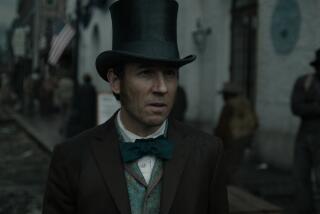On the Trail of Hoffa and All That Jazz
- Share via
Just this past week, in a major national newspaper, the poet laureate of the United States, Robert Pinsky, opined that “in legend and maybe in fact, [Jimmy] Hoffa is buried . . . perhaps under the end zone in Giants Stadium.” Even today, 23 years after the disappearance of the former president of the International Brotherhood of Teamsters, statements about his whereabouts have to be couched in a “maybe,” surrounded by a “legend” and presented with a “perhaps.”
Not so for Jon A. Jackson. His latest detective thriller featuring Det. Sgt. “Fang” Mulheisen, “Man With an Axe,” has no perhaps about it. Mulheisen is on the trail of Hoffa. And that trail is in Detroit.
On the evening of July 30, 1975, the iconoclastic black sax player Tyrone Addison and his girlfriend Vera are driving to dinner, when a stocky man carrying a hefty leather briefcase jumps into their van. Within minutes, it is clear to both Tyrone and Vera that they are aiding and abetting the escape of the infamous Mr. Hoffa from the equally so mob. Detroit is too hot, so Tyrone suggests a trip out of town to his Uncle Lonzo’s house in Turtle Lake, an African American resort. Who in the Mob would think a white man like Hoffa would hide out there?
Enter Grootka, Mulheisen’s mentor, another white man. A law unto himself, both as a detective and as an amateur sax player, he’s heard a rumor that his friend Tyrone is hanging around Turtle Lake. The innocent rumor draws him into this hot, racial geography, into the thick of the Hoffa story.
Twenty years later, Grootka is dead and Mulheisen is bored. While going through the effects of his late mentor, Mulheisen comes upon a series of Grootka’s notebooks, laying out the story of the sultry summer of ’75. As he discovers, to his puzzled annoyance, Grootka wrote these riddling notebooks just for him--chord charts just waiting for Mulheisen to fill in the melody.
Mulheisen is a contemplative sort of paradox--a single cop living with his patrician mother, as much a fan of Albert Ayler as of the Detroit Red Wings. It is, in fact, his Zen-like decision to sell his hockey playoff tickets in favor of a jazz concert by an African American free spirit named M’Zee Kinanda, that sets him on the way to solving Grootka’s mystery. A native feeling for jazz, a smattering of Dickens, an ear for the higher overtones of racial epithets and an appreciation of Cuban cigars are just some of the elements that make Mulheisen the perfect guy to solve the case. As Grootka promised Vera after that mysterious summer of ‘75, “Old Mulheisen would figure it all out when the time came.”
Which Mulheisen does, if with some difficulty. “When we stand in the present,” Mulheisen states, “confronted with this or that event, and look back, only the most narrow-sighted can see a single or even just a few paths dwindling into the distance. What any sensible person sees, I believe, is a network of paths and thoroughfares, cutting across one another, spreading out further and further. They’ve crossed here.” Jorge Luis Borges couldn’t have said it better.
Jackson writes with the same quirky appetite of his hero and the patience of a virtuoso jazzman. He plays the head, sets the novel up in good Elmore Leonard style and then takes his time, playing a chorus, visiting keys you might not think have anything to do with the plot. He knows you’ll stick with him as he introduces characters and subjects that might seem as far removed from a detective thriller as, say, the key of F-sharp and the Giants’ end zone. And then, pow--he clamps down on his hard-bitten mouthpiece--the man wails on his axe and blows the heat away!
But make no mistake--”Man With An Axe” is as entertaining as it is knowing; it winks and chuckles even as it gnaws at history. “The trouble with these things,” Grootka writes in his last notebook, “is that they never do stay under the ground. Somebody has got to dig, it’s human nature, especially when it’s such a big-time guy like Hoffa.” It’s a statement, perhaps, the poet laureate would dig.


